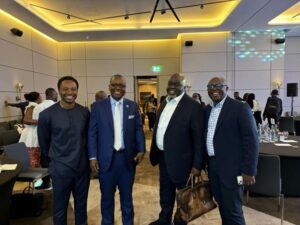As numerous foreign banks either exit or plan to exit various African markets as part of their de-risking strategies, Ghana International Bank (GHIB), has chosen a rather different approach to risk management in its sub-Saharan operations.
GHIB’s de-risking strategy for Africa is to train and upscale the capacities of correspondent banks in Africa to ensure the high standards of compliance required in facilitating cross-border trade.
At the just ended CNVERGE conference in London, Dean Adansi, Chief Executive Officer of GHIB, touched on this important issue and how the bank is positioning itself to fill the critical gap.
During his address, Mr. Adansi mentioned that by leveraging its regional expertise and robust network, GHIB is set to be a key player in the continent’s evolving economic landscape. “At a time when other financial institutions have de-risked and exiting the Sub-Saharan Africa region, GHIB has elected to build capacity in the region and finance trade on the continent.”
He added that, “During the recent financial crisis in Ghana, GHIB continued to finance trade even as other banks retreated and de-risked. Given the important role of treating advancing growth in our markets, it’s imperative that we find and implement solutions to promote trade activity.
“I think the biggest question to keep in mind as we explore and discuss species related to trade of this conference is how best to play our part in growing trade in our markets.”

Ghana International Bank (GHIB), through its CNVERGE conference, is committed to being a pivotal player in addressing these challenges and shaping the future of African trade. As one of the pioneering pan-African financial institutions in the City of London, GHIB is uniquely positioned to lead these critical conversations.
CNVERGE has been specifically designed to harness GHIB’s extensive experience and leverage its network of partners, clients, and even competitors. Through this platform, the bank aims to initiate a continuous series of roundtables focused on generating, discussing, and implementing new ideas to foster the growth of African trade.
The inaugural conference, which was held under the theme ‘The Risk/Opportunity Interplay for African Trade’, had participants from over 60 corporates, sovereigns and banks operating in the United Kingdom and Sub-Sahara Africa. High-level representatives from the central banks of Ghana and The Gambia as well as trade and economic attaches from African High Commissions in London, attended the event.
International Trade in Africa has long faced significant barriers due to the trade finance gap, a persistent and formidable obstacle that hampers business activities both within the continent and with external partners. This gap, characterized by the disparity between the demand for and supply of trade finance, was estimated by the African Development Bank to have reached a staggering US$81.8 billion in 2019. More recent assessments suggest that this shortfall could now be as high as US$120 billion.
The situation has been further aggravated by a global trend of de-risking, which has led to the withdrawal of many global banking franchises from the African market.
This retrenchment has been driven by concerns over the perceived risks associated with financial transactions in the region, compounding the challenges faced by businesses that rely on trade finance to facilitate cross-border trade and investment.

The withdrawal of global banks from Africa jeopardizes access markets because of a dearth in correspondent banking for trade, which is critical for emerging economies.
The confluence of these factors underscores the urgent need for innovative solutions and enhanced support mechanisms to bridge the trade finance gap and stimulate economic growth across Africa.
In all of this, GHIB’s approach has been to keep faith with correspondent banks on the continent to enable them provide quality services to their clients. GHIB has been at the forefront of trade financing in Anglophone West Africa (excluding Nigeria), having handled US$6.5 billion in documentary trade collections over the past five years.
The bank boasts 70 counterparty and correspondent banking relationships across Sub-Saharan Africa. Additionally, GHIB has successfully executed over US$600 million in secondary market trade finance transactions and US$1.3 billion in primary trade finance transactions within the region during the same period. In 2023 alone, the bank estimates it facilitated US$8.5 billion in downstream payments to West Africa.
Ghana International Bank (GHIB) was incorporated in the United Kingdom with a unique mandate to support the economies of Ghana and the wider African continent. We are a dynamic pan-African bank supporting a dynamic continent. Through our market knowledge and strong relationships, we work to foster trade, promote companies’ business growth, deliver cost-effective services to individuals and drive sustained economic development.
By working together, we aim to create a brighter future for everyone: our customers, staff, shareholders and the communities we serve. GHIB focuses on six key areas: treasury and global markets, trade finance, corporate and institutional banking, retail and small business banking, correspondent banking, and payment solutions.










